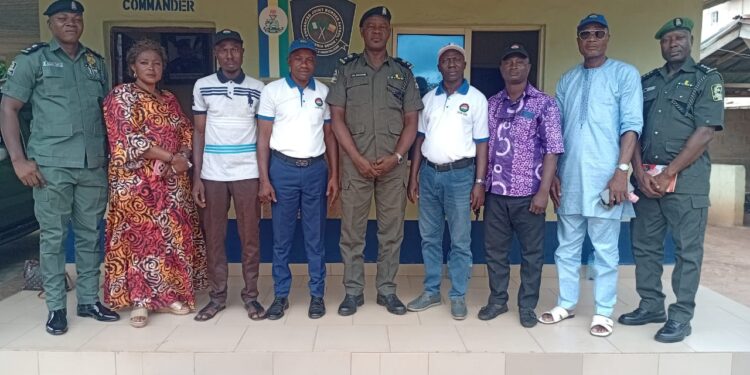
By Ibrahim Kegbegbe, Ogun State
The Nigerian Labour Congress (NLC), Ipokia Local Government Council, Ogun State, has once again engaged the leadership of the Nigeria Border Patrol, Idiroko Command, in dialogue over the growing menace of multiple checkpoints, extortion, and the unruly conduct of “camp boys” along the Owode–Idiroko road.
The meeting, held on Thursday, November 6, 2025, at the Idiroko Border Patrol Command, was part of the union’s ongoing efforts to address issues affecting the survival of legitimate businesses and transport operators in the border community.
Leading the NLC delegation was the Ipokia Local Government Chairman, Comrade Ojuola Ayuba, accompanied by his executive members — Comrade Godonu Emmanuel S. (Secretary), Comrade Gafar Olubukola (Assistant Secretary), Comrade Kovobau Saanu (Ex-Officio I), Comrade Balogun Dauda (Ex-Officio II), and Comrade Olaegbe Sikiru (Vice Chairman).
They were received by the Commander of the Border Patrol, CSP Kayode Emmanuel, alongside ASP Oludayo and DSP Adamu Musa.
NLC Decries Harassment, Unlawful Extortion
Speaking during the meeting, Comrade Ayuba expressed deep concern over the persistent harassment, extortion, and abuse of power by some officers and unauthorized “camp boys” operating along the border routes.
He noted that legitimate traders, transporters, and residents have been subjected to inhumane treatment, often forced to pay illegal levies, while their goods — including perishable items such as tomatoes, onions, and peppers — are seized under dubious circumstances.
“These unwholesome practices are not only stifling economic activities in Idiroko and its environs but also contributing to the rising cost of food in the area,” Ayuba lamented.
He emphasized that the NLC preferred dialogue to confrontation but warned that if the current situation persisted, the union might be compelled to explore alternative measures.
The union leader also condemned the growing trend of officers searching travellers’ phones and laptops without lawful justification, describing it as “an outright abuse of power and violation of citizens’ privacy rights.”
Border Patrol Commander Pledges Reform
In his response, CSP Kayode Emmanuel commended the NLC executives for choosing dialogue over protest, pledging to address all legitimate concerns raised by the labour body.
He clarified that while stop-and-search operations remain an integral part of the Border Patrol’s mandate to prevent the smuggling of contraband goods, “searching travellers’ phones or laptops is not permitted unless backed by a formal petition or specific intelligence report.”
The commander revealed that he had already issued strict warnings to his personnel against such misconduct and vowed to sanction any officer found guilty of extortion or illegal searches.
On the issue of “camp boys,” Emmanuel stated emphatically that their involvement in checkpoint operations is illegal and has been banned. “Any officer still engaging the services of these boys will face disciplinary action,” he said.
A Step Toward Restoring Public Confidence
CSP Emmanuel assured that efforts were ongoing to streamline checkpoints along the Owode–Idiroko corridor to ease the free movement of people and goods. He reiterated his commitment to restoring public confidence in the Nigeria Mobile Police and other security agencies operating within the border axis.
In his closing remarks, Comrade Olaegbe Sikiru, who gave the vote of thanks, expressed appreciation for the commander’s openness and responsiveness. He acknowledged that the situation on the road had already shown signs of improvement but urged the Border Patrol Command to intensify its reforms for lasting impact.
He added that the NLC, as the voice of the working class, would continue to monitor developments and advocate for fairness, accountability, and a business-friendly environment in the border communities.
READ ALSO:Tinubu Hails Soludo’s Re-election, Describes Victory as Affirmation of Visionary Leadership
Background
The Owode–Idiroko axis, one of the busiest land border routes in Ogun State, has long been plagued by reports of multiple security checkpoints, extortion, and illegal toll collections by unauthorized individuals. The road serves as a major link for traders, motorists, and farmers transporting goods between Nigeria and neighbouring Benin Republic.
Stakeholders have repeatedly called for government intervention to curb the excesses of law enforcement agents and restore sanity along the strategic corridor, considered vital for the economic survival of communities in the Yewa axis of Ogun State.

















